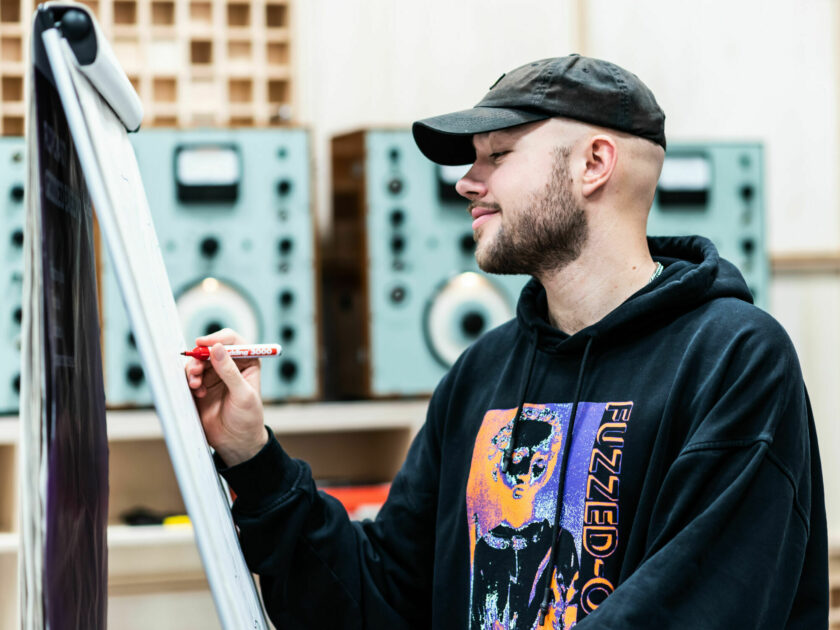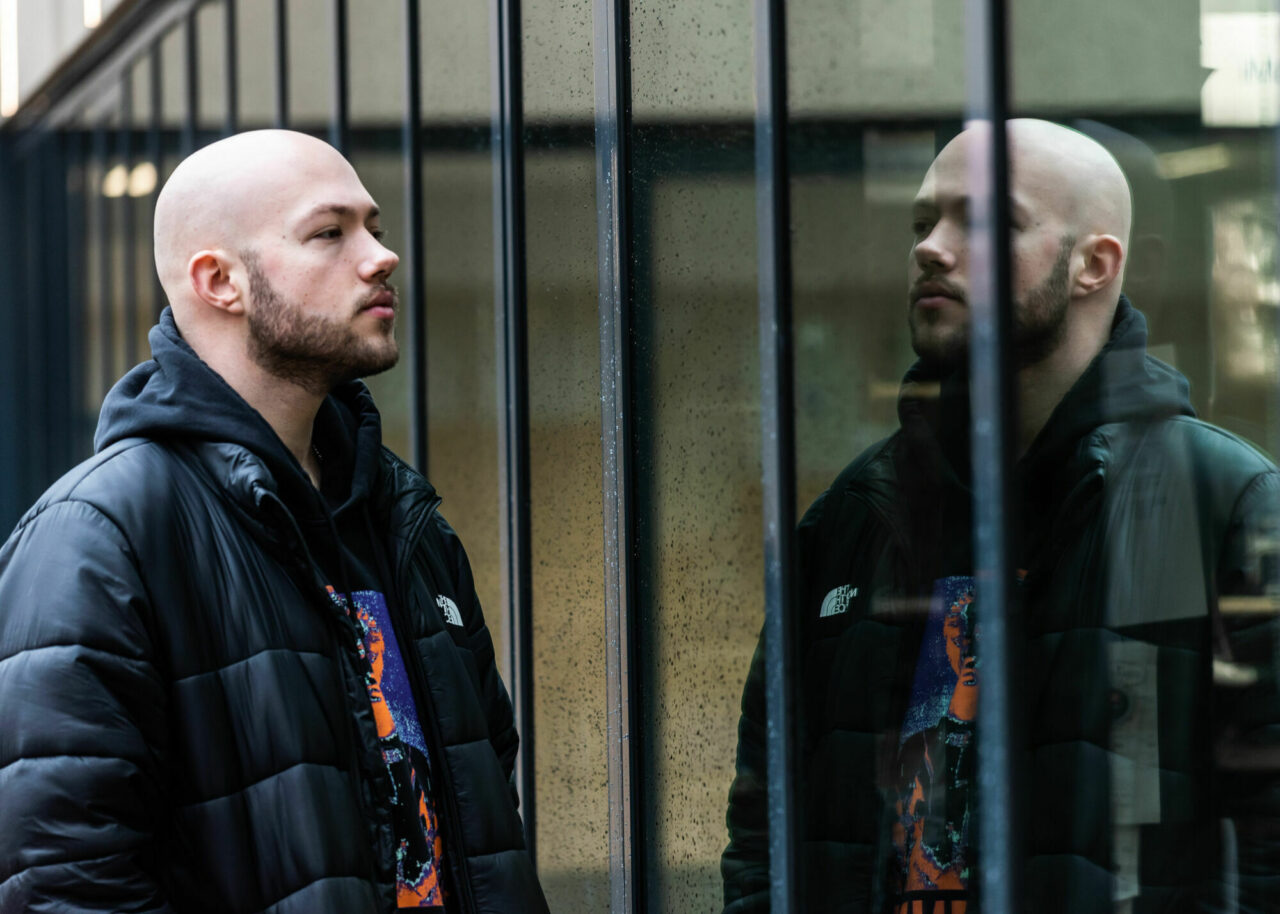I am very grateful that I can spend my time doing the things that make me happy.
Max Frimout, Bachelor of Sonology student, is a sound artist from Eindhoven. One of his main endeavors is the artistic direction of Odio: an iOS app he co-created which hosts interactive sonic artworks with a focus on spatial aesthetics in a virtual space. Max is a performer of live electronic music. Currently his performance practice is centered around a research into movement and sound with choreographer Alesya Dobysh.
This interview began with a short message from one of our Sonology students via Instagram in June 2022: “Hey KonCon Online, can you do a shout-out for Max, he just won the Apple Design Awards.” Newspapers and online forums already started to spread the word: A Dutch app called Odio won the prize for Innovation at the Apple Design Awards. Great news indeed and definitely worth a shout-out.
The Institute of Sonology at the Royal Conservatoire
This short Insta direct message portrays the Insitute of Sonology well: Students celebrate each other’s success. Instead of competition, you can find unity and support for each other. Joining Sonology means joining a tight international community of active artists and musicians of more than 30 different nationalities. The Institute of Sonology has a 50-year tradition of education, research and production in the fields of electroacoustic music and computer music. Students can use our well-equipped studios in Amare, workshops and concert halls, including a Wave Field Synthesis system and the most extensive voltage-controlled analogue studio currently in operation. Sonology’s Bachelor and Master of Music programmes are rated as ‘excellent’ and achieve very good results in student surveys.
The Odio App
Max was recently awarded one of the most prestigious prizes an app can possibly win: the Apple Design Award. He sits in the cafeteria in Amare. He quickly grabs a snack for lunch before he heads back to classes. On his mind is a big assignment he has to hand in by next week for his studies. The idea behind Odio is actually quite simple: Through a simple interface on your smart phone, you can alter the arrangement of sound objects in a virtual space. The listener can re-arrange the sound objects, add and remove them in order to create their personal take on the compositions. The app was developed by Max Frimout, Joon Kwak and Volst Software Eindhoven.
The Graduation Project: Shaping a Chain of Choices
The new year 2023 just started. The Hague hibernates under a foggy blanket of clouds and the Royal Conservatoire students are returning from their Christmas break ready for the busy second half of the academic year. Max is preparing to graduate this year and used his break to relax, enjoy great food and to think a bit about his graduation project. For his graduation project, he is collaborating with a Korean Dance Company. Max is examining chaotic movement and its applications in the context of live electronic music informed by rehearsals with dancers, discourse with choreographers and design choices for processing amplified footwork. This graduation piece takes place on the 17th and 18th of June at The Grey Space in the Middle.
Last year, he spent time in Seoul to set up this collaboration and this year, two of the dancers will come to The Hague in order to perform with Max. Funding by the Art Council Korea (ARKO) made this collaboration possible. Next to this project, Max had the chance to dive into the night life of Seoul and play at night club Faust, located in Iteawon.
Harp
Being born into a family of harpists, Max naturally started his musical journey on the harp as well. His mom studied classical harp at the Royal Conservatoire and his sister Kyra followed in their mom’s footsteps, studying the harp at KC as well. He still plays the electronic harp every now and then, but for Max, his mom’s recording and audio equipment was far more interesting. Whenever he had the chance, he would sneak into her study to try out new things. By now, his synthesizer collection has grown significantly but he still prefers the synthesizers he has already been playing for more than 10 years. ‘To me, my synthesizer is my ‘’concert harp’’. It is my precious instrument which travels with me wherever I perform. I prefer playing live on my own synthesizer. I see myself as an instrumentalist.’
How Max found his way into the world of Sonology

Through a high-school friend, one deciding day, he ends up at one of the Sonology Discussion Concerts in The Hague. He is immediately intrigued and wants to learn more about the world of electronic music. He decides to put his studies in Eindhoven at the faculty for Applied Physics on pause and applies for the Bachelor of Sonology at the Royal Conservatoire. ‘The first semester, I spent with asking my teachers a lot of questions, which was great.’ Max studies with Bjarni Gunnarsson, Raviv Ganchrow, Ji Youn Kang and Peter Pabon. ‘Learning about the history of electro-acoustic music helped me broaden my own questions, to test and sharpen my own ideas. Within Sonology, you will meet interesting people to have great conversations with. We help each other out with installations and projects and we organise concerts together.’
The curriculum is very well- balanced. There’s a solid technical foundation given and a rigorous attitude to research, which will give you a solid knowledge foundation to build your artistic practice on. On the other hand, you have a lot of freedom to work on your own projects, you have the space to deepen yourself into your bachelor’s thesis and prepare for your final presentation.
So, what about the future?
This summer, Max will graduate. With a Bachelor of Sonology in his pocket and the success of his app, many doors in the professional world will be opening up for him. For one, he will finally fly to California and visit the head quarter of Apple. Max applied for the Master of Sonology so he might just stay another two years. But his most important ambition for the future is to stay open to new ideas and developments: Our app Odio is based on software that didn’t exist two years ago. I am curious about new technologies that will emerge in the next couple of years and I hope that I will be able to develop new works with them. The last two years were very interesting and rewarding and I hope that I can continue like that for a couple more years. I am very grateful that I can spend my time doing the things that make me happy.’
And this is something, we also wish Max: many more brilliant ideas, inspiring concerts and great collaborations around the world.
Could we make you curious to learn more about studying Sonology at the Royal Conservatoire? Check out our programme pages. Don’t hesitate to reach out to department head Kees Tazelaar for all your questions via sonology.org/contact.

